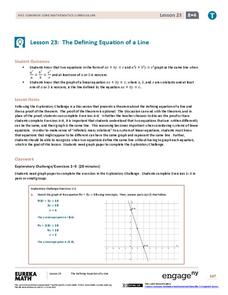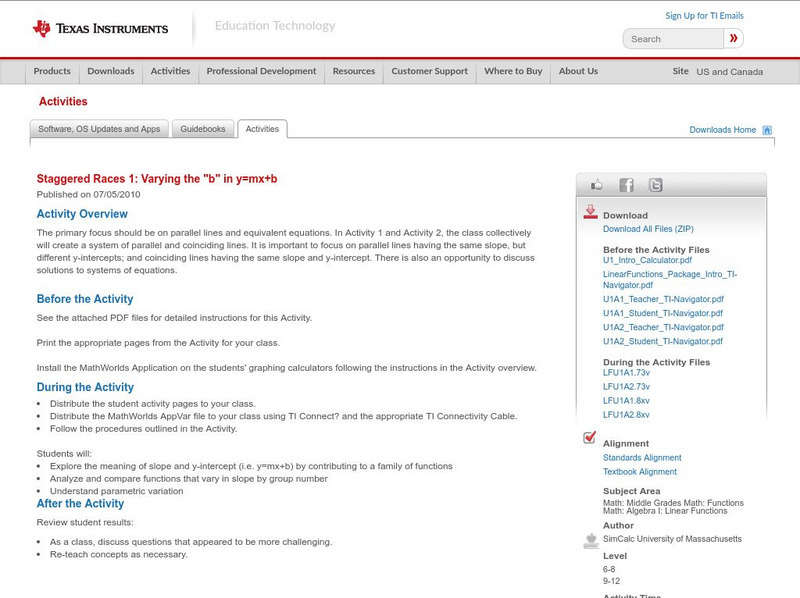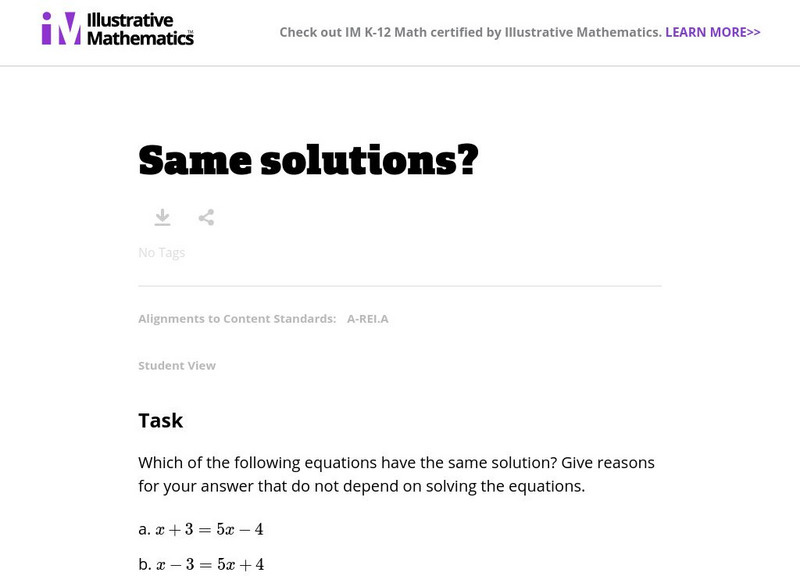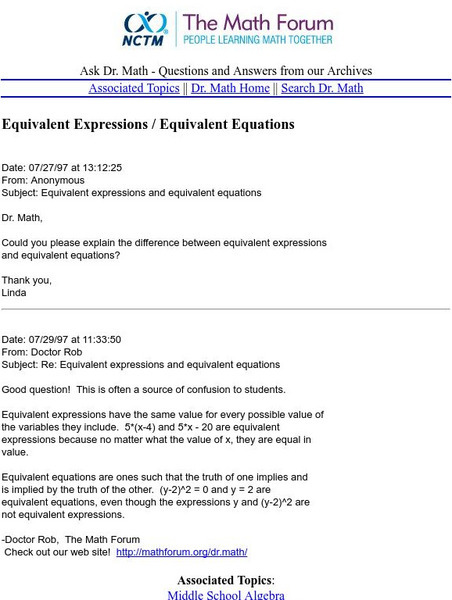EngageNY
Solutions of a Linear Equation
Use the distributive property to solve equations. The sixth lesson in a 33-part series has scholars solve equations that need to be transformed into simpler equations first. Class members apply the distributive property to the equations...
CK-12 Foundation
Values Written as Powers: Binary Numbers 9 to 16
Challenge mathematicians to crack the binary code with an interactive that focuses on numbers nine to 16. A table reveals exponential equations to aid in answering multiple-choice questions. A discussion question gauges comprehension.
Illustrative Mathematics
Valid Equalities?
True or false: 20 = 10 + 10. The statement is true because two 10s make a 20. These are the types of equations learners must label or false. They must also explain in mathematical terms how they know.
EngageNY
Mid-Module Assessment Task: Grade 7 Mathematics Module 3
Lesson 16 in the series of 28 is a mid-module assessment. Learners simplify expressions, write and solve equations, and write and solve inequalities. Most questions begin as word problems adding a critical thinking component to the...
Illustrative Mathematics
Building an Explicit Quadratic Function by Composition
Use equivalent expressions to reveal information about their graphs. Pupils verify that two quadratic functions are equivalent. By comparing the two expressions, they determine the vertex, the zeros, the y-intercept, and the...
EngageNY
The Defining Equation of a Line
They appear to be different, yet they are the same line. Part 24 out of 33 lessons provides a theorem about the relationships of coefficients of equivalent linear equations. Pupils use the theorem to determine whether two equations are...
Mathematics Assessment Project
Sorting Equations and Identities
Identify the identity. Learners first solve equations to find the number of solutions. Scholars then determine if given equations are always, sometimes, or never true, leading to the concept of identities.
Pearson
End of Year Practice Test (Grade 8 Math)
This is a great resource to keep daily material aligned to standardized assessments. It offers complete multiple choice and short-answer practice with a wealth of opportunities for customization. Offer it as a whole,...
Illustrative Mathematics
Sammy's Chipmunk and Squirrel Observations
Here is a fun project. Sammy observes a chipmunk and a squirrel to see how many holes each needs in order to stash the same number of acorns. Scholars could find the answer algebraically or create a table to analyze the...
Illustrative Mathematics
6.EE.4 Equivalent Expressions
Straight to the point, learners are asked to compare a set of five expressions, determine which are equivalent, and then write equivalent equations for those that do not have any. A benefit is that they will review using properties...
Curated OER
Logarithmic Equations
For this logarithmic equations worksheet, learners cut apart 16 squares. Each square has four equations, one per side. They match equivalent equations, creating a new square when successful.
Curated OER
Equivalent Equations
Answer the age-old question every middle schooler has, what are equivalent equations? Here, they will explore the concept, discuss what equivalent equations are, and how to solve them. They also discuss performing an operation on both...
Curated OER
Introduction To Solving Equations
Use manipulatives (film cans and balance scales) to visualize and solve equivalent equations with your math class. After a lecture/demo, they utilize handouts and solve various equations using the methods learned.
Texas Instruments
Texas Instruments: Staggered Races 1: Varying the ?B? In Y=mx+b
The primary focus in this activity is on parallel lines and equivalent equations. In Activity 1 and Activity 2, the class collectively will create a system of parallel and coinciding lines. It is important to focus on parallel lines...
Math Planet
Math Planet: Algebra 1: Properties of Equalities
Provides examples and a video lesson that illustrates the properties of equalities.
Illustrative Mathematics
Illustrative Mathematics: A Rei.1 2 Same Solutions?
Students are shown six equations and must identify those that have the same solution and give their reasoning, without depending on actually solving them. This task encourages students to look for structure when comparing equations and...
University of Georgia
University of Georgia: Inter Math: Linear Equation
This site defines a linear equation in a very basic and understandable way. The opening page gives examples of linear equations and questions posed to the reader which may be answered easily by examining the definition given. Be sure to...
Help Algebra
Help algebra.com: Addition Principle
Beginning with a discussion of equivalent equation, this site describes the Addition Principle and how it is used to help solve algebraic equations.
Help Algebra
Help algebra.com: Multiplication Principle
Multiplying on both sides of an equation is demonstrated with several examples. The resource also includes dividing on both sides in order to solve an equation.
National Council of Teachers of Mathematics
The Math Forum: Equivalent Expressions and Equations
Dr. Math at the Math Forum explains the difference between equivalent expressions and equivalent equations.



















